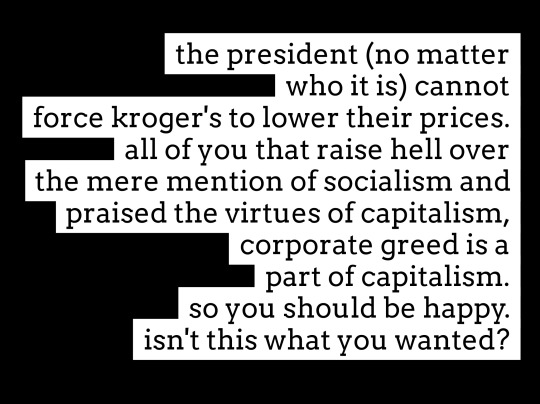#consumerism
Text
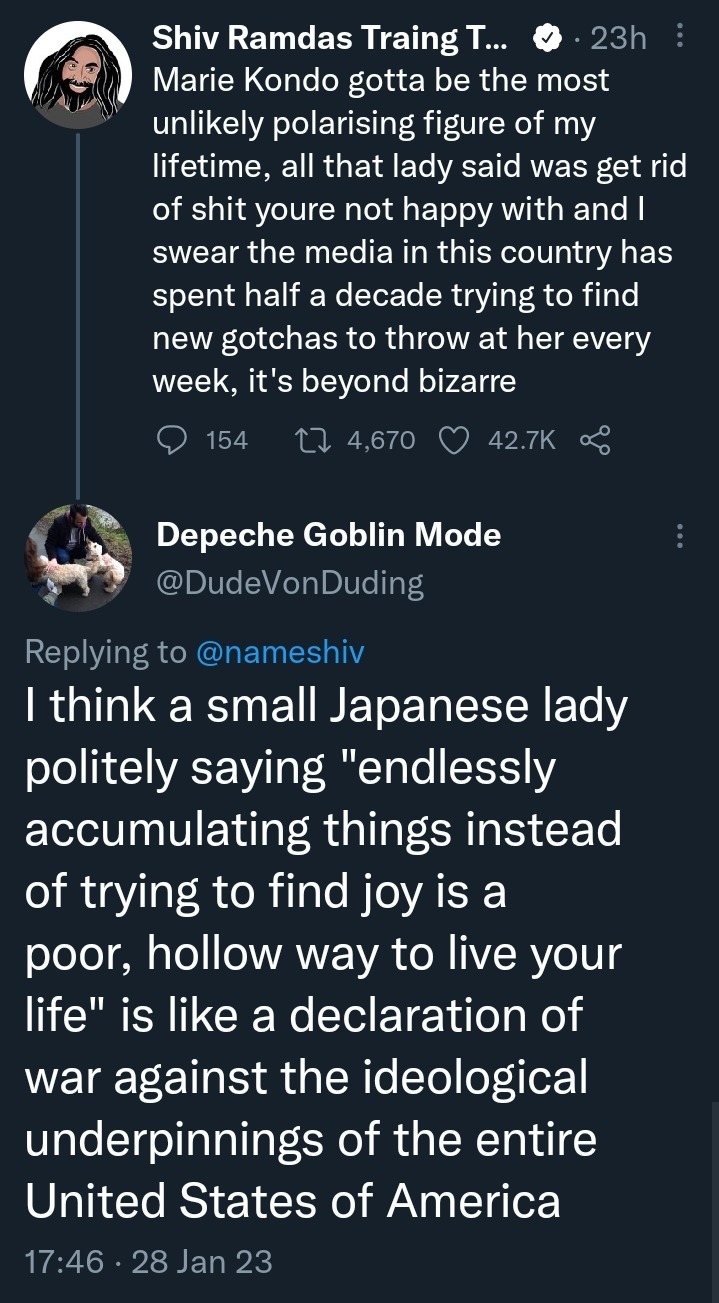
#marie kondo#konmari#racism#capitalism#consumer culture#consumerism#usamericans#white people#knee of huss
42K notes
·
View notes
Photo






a collection of “potato chips shaped like hearts” ranging from $900–$7,000 currently on eBay...
8K notes
·
View notes
Text
youtube
Watch the American Climate Leadership Awards 2024 now: https://youtu.be/bWiW4Rp8vF0?feature=shared
The American Climate Leadership Awards 2024 broadcast recording is now available on ecoAmerica's YouTube channel for viewers to be inspired by active climate leaders. Watch to find out which finalist received the $50,000 grand prize! Hosted by Vanessa Hauc and featuring Bill McKibben and Katharine Hayhoe!
#ACLA24#ACLA24Leaders#youtube#youtube video#climate leaders#climate solutions#climate action#climate and environment#climate#climate change#climate and health#climate blog#climate justice#climate news#weather and climate#environmental news#environment#environmental awareness#environment and health#environmental#environmental issues#environmental justice#environment protection#environmental health#Youtube
4K notes
·
View notes
Text
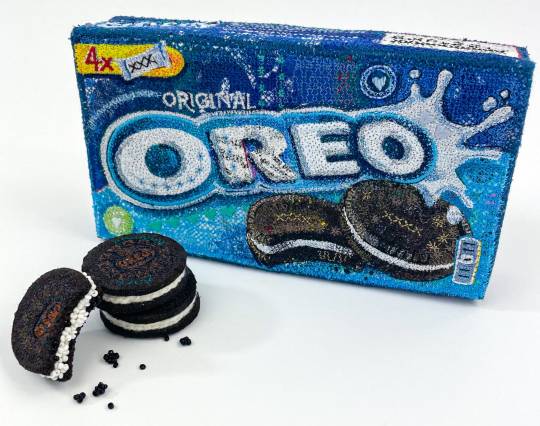
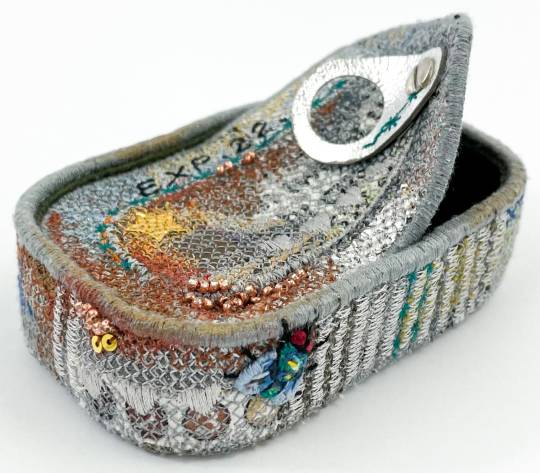
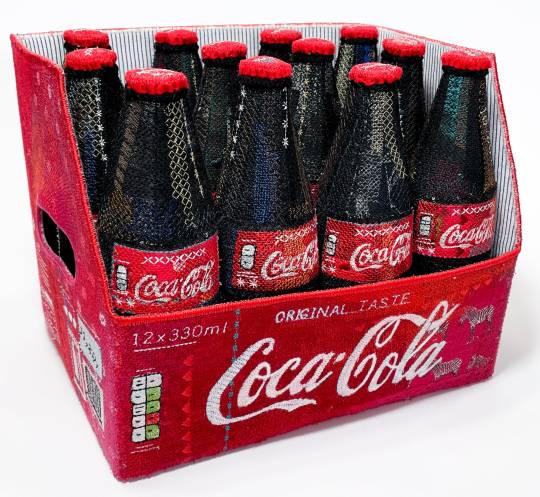
Embroidered Snacks and Mass-Produced Food by Alicja Kozlowska Chew On Consumerist Culture
8K notes
·
View notes
Text
Right-wingers: "Capitalism is all about innovation and consumer choice and opposing stagnant uniformity!
90% of inhabited capitalist America:
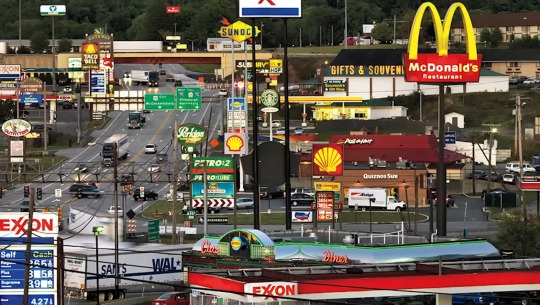
1K notes
·
View notes
Text
against the logic of the lawn
Imagine a box.
This box is sealed with tape or adhesive, which shows you that it has never been opened or re-used. It is in pristine condition. Apart from that, the box could hold anything. It could contain a Star Wars Funko Pop, a printer, a shirt ordered from some sketchy online vendor, a knockoff store-brand cereal, six individually wrapped protein bars.
As a Consumer ("the" Consumer) this is your fundamental right: To purchase a box that is, presumably, identical to every other box like it.
When you Buy Product, it arrives in a box, entire of itself and without context. It has not changed since its creation. If and when Product does change—whether it is broken, spoiled, used up, or eaten—you can Buy Product that is identical in every meaningful way to the original.
It's okay if this doesn't make sense yet. (You can stop imagining the box now.)
Imagine instead a suburban housing development, somewhere in the USA.
Imagine row on row of pristine, newly built houses, each constructed with small, meaningless variations in their aesthetic, all with beige or white vinyl siding and perhaps some decorative brick, all situated on identical rectangles of land covered with freshly unrolled sod. This is the Product that every consumer aspires to Buy.
I am not exactly—qualified, or entitled, to speak on the politics of land ownership in this country. My ancestors benefited directly from the genocide of Native Americans, which allowed Europeans to steal the land they lived on, which is where a lot of wealth comes from in the end, even today. However, I have eyes in my head to see that the act of colonizing a continent, and an economic system that formed as a supporting infrastructure to colonization, have embedded something almost irreparably dysfunctional into the dominant American culture's relationship to land.
This dysfunctional Thing, this Sickness, leads us to consider land to be a Product, and to consider a human upon the land to be a Consumer.
From this point of view, land is either locked into this relationship of control and "use" to varying extents, or it is free of human influence. People trying to reason about how to preserve Earth's biosphere, working within this framework without realizing, decide that we must "set aside" large areas of land for "nature."
This is a naive and, I would reckon, probably itself colonialist way of seeing things. It appears to be well-validated by evidence. Where human population is largest, there is less biodiversity.
But I find the broad conclusions to be strikingly unscientific. The plan of "setting aside part of Earth for nature" displays little curiosity about the mechanisms by which human presence impacts biodiversity. Otherwise intelligent people, perhaps caught up in the "bargaining" phase of climate grief, seem taken in by the idea that the human species gives off a magical anti-biodiversity force field, as if feeling guiltier will fix the problems.
(Never mind that lands managed by indigenous folk actually have MORE biodiversity...almost like our species' relationship to the planet isn't inherently exploitative, but rather, the capitalist and colonialist powers destroying everything.......)
Let's go back to the image of the new housing development. This image could be just about anywhere in the USA, because the American suburban home is made for universal interchangeability, where each little house and yard is static and replaceable with any other.
Others have written about the generic-ification of the interiors of homes, how houses are decorated with the most soul-killing, colorless furnishings to make them into Products more effectively. (I think @mcmansionhell wrote about it.)
This, likewise, is the Earth turned into a Product—razed down into something with no pre-existing context, history, or responsibility. Identical parcels of land, identical houses, where once there was a unique and diverse distribution of life. The American lawn, the American garden, the industry that promotes these aesthetics, is the environmental version of that ghastly, ugly "minimalism" infecting the interiors of homes.
The extremely neat, sparse, manicured look that is so totally inescapable in American yards originated from the estates of European aristocracy, which displayed the owner's wealth by flaunting an abundance of land that was both heavily managed and useless. People defend the lawn on the basis that grass tolerates being walked upon and is good for children to play, but to say this is *the* purpose of a lawn is bullshit—children are far more interested in trees, creeks, sticks, weeds, flowers, and mud than Grass Surface, many people with lawns do not have children, and most people spend more time mowing their lawn than they do doing literally anything else outside. How often do you see Americans outside in their yards doing anything except mowing?
What is there to do, anyway? Why would you want to go outside with nothing but the sun beating down on you and the noise of your neighbors' lawn mowers? American culture tries to make mowing "manly" and emphasizes that it is somehow fulfilling in of itself. Mowing the lawn is something Men enjoy doing—almost a sort of leisure activity.
I don't have something against wanting a usable outdoor area that is good for outdoor activities, I do, however, have something against the idea that a lawn is good for outdoor activities. Parents have been bitching for decades about how impossible it is to drag kids outdoors, and there have been a million PSAs about how children need to be outside playing instead of spending their lives on video games. Meanwhile, at the place I work, every kid is ECSTATIC and vibrating with enthusiasm to be in the woods surrounded by trees, sticks, leaves, and mud.
The literal, straightforward historical answer to the lawn is that the American lawn exists to get Americans to spend money on chemicals. The modern lawn ideal was invented to sell a surplus of fertilizer created after WW2 chemical plants that had been used to make explosives were repurposed to produce fertilizer. Now you know! The more analytical, sociological answer is that the purpose of the lawn is to distance you from the lower class. A less strictly maintained space lowers property values, it looks shabby and unkempt, it reflects badly on the neighborhood, it makes you look like a "redneck." And so on. The largest, most lavish McMansions in my area all have the emptiest, most desolate yards, and the lush gardens all belong to tiny, run-down houses.
But the answer that really cuts to the core of it, I think, is that lawns are a technology for making land into a Product for consumers. (This coexists with the above answers.) Turfgrass is a perfectly generic blank slate onto which anything can be projected. It is emptiness. It is stasis.
I worry about the flattening of our imaginations. Illustrations in books generally cover the ground outdoors in a uniform layer of green, sometimes with strokes suggesting individual blades of grass if they want to get fancy. Video games do this. Animated shows and movies do this.
Short, carpet-like turfgrass as the Universal Outdoor Surface is so ubiquitous and intuitive that any alternative is bizarre, socially unacceptable, and for many, completely unimaginable. When I am a passenger in a car, what horrifies me the most to see out the window is not only the turfgrass lawns of individuals, but rather, the turfgrass Surface that the entire inhabited landscape has been rendered into—vacant stretches of land surrounding businesses and churches, separating parking lots, bordering Wal-Marts, apartment complexes, and roadsides.
These spaces are not used, they are almost never walked upon. They do nothing. They are maintained, ceaselessly, by gas-powered machines that are far, far more carbon-emitting than cars per hour of use, emitting in one hour the same amount of pollution as a 500-mile drive. It is an endless effort to keep the land in the same state, never mind that it's a shitty, useless state.
Nature is dynamic. Biodiversity is dynamic. From a business point of view, the lawn care industry has found a brilliant scheme to milk limitless money from people, since trying to put a stop to the dynamism and constant change of nature is a Sisyphean situation, and nature responds with increasingly aggressive and rapid change as disturbance gets more intense.
On r/lawncare, a man posted despairingly that he had spent over $1500 tearing out every inch of sod in his yard, only for the exact same weeds to return. That subreddit strikes horror in my heart that I cannot describe, and the more I learn about ecology, the more terrible it gets. It was common practice for people in r/lawncare to advise others to soak their entire yard in Roundup to kill all plant life and start over from a "blank slate."
Before giving up, I tried to explain over and over that it was 100% impossible to get a "blank slate." Weeds typically spread by wind and their seeds can persist for DECADES in the soil seed bank, waiting for a disastrous event to trigger them to sprout. They will always come back. It's their job.
It was impossible for those guys to understand that they were inherently not just constructing a lawn from scratch, and were contending with another power or entity (Nature) with its own interests.
The logic of the lawn also extends into our gardens. We are encouraged to see the dynamism of nature as something that acts against our interests (and thus requires Buy Product) so much, that we think any unexpected change in our yard is bad. People are sometimes baffled when I see a random plant popping up among my flowers as potentially a good thing.
"That's a weed!" Maybe! Nonetheless, it has a purpose. I don't know who this stranger is, so I would be a fool to kill it!
A good caretaker knows that the place they care for will change on its own, and that this is GOOD and brings blessings or at least messages. I didn't have to buy goldenrod plants—they came by themselves! Several of our trees arrived on their own. The logic that sees all "weeds" as an enemy to be destroyed without even identifying ignores the wisdom of nature's processes.
The other day at work, the ecologist took me to see pink lady's slipper orchids. The forest there was razed and logged about a hundred years ago, and it got into my head to ask how the orchids returned. He only shrugged. "Who knows?"
Garden centers put plants out for sale when they are blooming. People buy trees from Fast Growing Trees dot com. The quick, final results that are standard with Buy Product, which are so completely opposite the constant slow chaos of nature, have become so standard in the gardening world that the hideous black mulch sold at garden centers is severed from the very purpose of mulch, and instead serves to visually emphasize small, lonely plants against its dark background. (For the record, once your plants mature, you should not be able to SEE the mulch.)
Landscapers regularly place shrubs, bushes, trees and flowers in places where they have no room to reach maturity. It's standard—landscapers seem to plan with the expectation that everything will be ripped out within 5-10 years. The average person has no clue how big trees and bushes get because their entire surroundings, which are made of living things (which do in fact feel and communicate) are treated as disposable.
Because in ten years, this building won't be an orthodontists' office, in ten years, this old lady will be dead, in ten years, the kids will have grown, and capitalism is incapable of preparing for a future, only for the next buyer.
The logic of the lawn is that gardens and ecosystems that take time to build are not to be valued, because a lush, biodiverse garden is not easily sold, easily bought, easily maintained, easily owned, or easily treated with indifference. An ecosystem requires wisdom from the caretaker. That runs contrary to the Consumer identity.
And it's this disposable-ness, this indifference, that I am ultimately so strongly against, not grass, or low turf that you can step on.
What if we saw buying land as implying a responsibility to be its caretaker? To respect the inhabitants, whether or not we are personally pleased by them or think they look pretty? What creature could deserve to be killed just because it didn't make a person happy?
But the Consumer identity gives you something else...a sense of entitlement. "This is MY yard, and that possum doesn't get to live there." "This is MY yard, and I don't want bugs in it." "This is MY yard, and I can kill the spiders if I want to."
Meanwhile there is no responsibility to build the soil up for the next gardener. No responsibility to plant oaks that will grow mighty and life-giving. No responsibility to plant fruit-producing trees, brambles, and bushes. None of these things, any of which could have fulfilled a responsibility to the future. Rather, just to do whatever you damn well please, and leave those that come after with depleted, compacted soil and the aftermath of years of constant damage. It took my Meadow ten years to recover from being the garden patch of the guy that lived here before us. Who knows what he did to it.
The loss of topsoil in all our farmland is a bigger example, and explains how this is directly connected to colonialism. The Dust Bowl, the unsustainable farming practices that followed, the disappearance of the lush fertile prairie topsoil because of greed and colonizer mindset, and simple refusal to learn from what could be observed in nature. The colonizing peoples envisioned the continent as an "Empty" place, a Blank Slate that could be used and exploited however.
THAT is what's killing the planet, this idea that the planet is to be used and abused and bought and sold, that the power given by wealth gives you entitlement to do whatever you want. That "Land" is just another Product, and our strategies for taking care of Earth should be whatever causes the most Buy Product.
It's like I always write..."You are not a consumer! You are a caretaker!"
#plants#native plants#no lawns#kill your lawn#anti lawn#consumerism#capitalism#colonialism#genocide tw
2K notes
·
View notes
Text
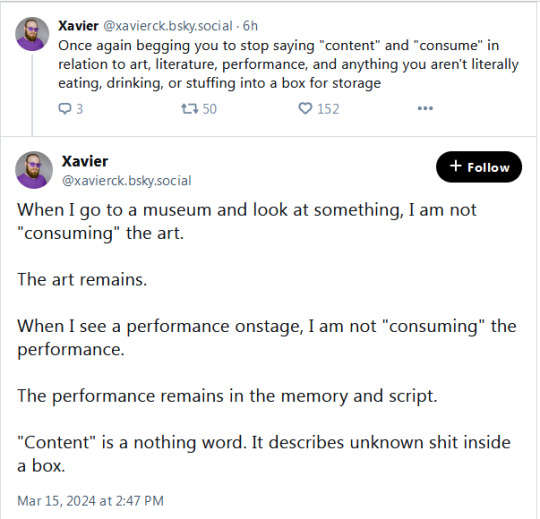
466 notes
·
View notes
Text
We ask your questions so you don’t have to! Submit your questions to have them posted anonymously as polls.
#polls#incognito polls#anonymous#tumblr polls#tumblr users#questions#polls about ethics#submitted nov 30#ethics#polls about the internet#consumerism#capitalism
790 notes
·
View notes
Text
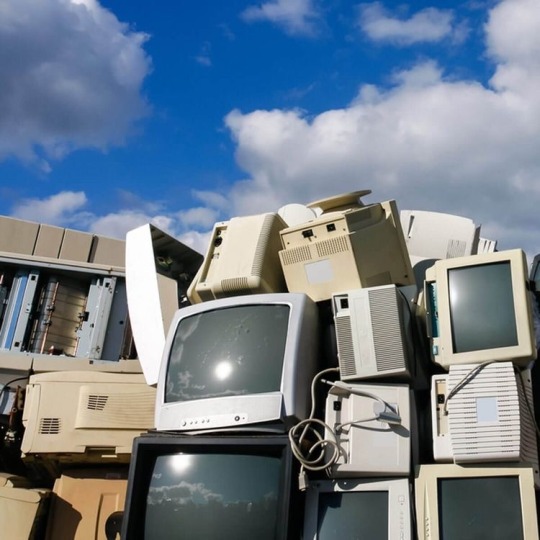
cheri.png
#good morning from me and consumerism#old internet#old web#00s#y2k#2000s#cyber y2k#cybercore#moodboard#cyber core#tech#cybertrash#consumerism#old pc#sky#old computers#vintage tech#vaporwave#y2kcore#y2k nostalgia#nostalgia#curators on tumblr#y2k blog#tech core#techcore
1K notes
·
View notes
Text
A taxonomy of corporate bullshit
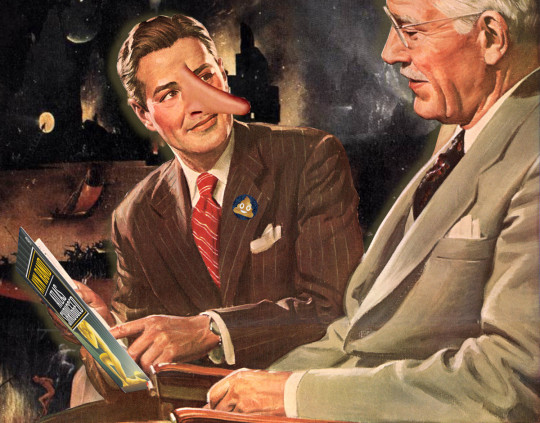
Next Tuesday (Oct 31) at 10hPT, the Internet Archive is livestreaming my presentation on my recent book, The Internet Con.

There are six lies that corporations have told since time immemorial, and Nick Hanauer, Joan Walsh and Donald Cohen's new book Corporate Bullsht: Exposing the Lies and Half-Truths That Protect Profit, Power, and Wealth in America* provides an essential taxonomy of this dirty six:
https://thenewpress.com/books/corporate-bullsht
In his review for The American Prospect, David Dayen summarizes how these six lies "offer a civic-minded, reasonable-sounding justification for positions that in fact are motivated entirely by self-interest":
https://prospect.org/culture/books/2023-10-27-lies-my-corporation-told-me-hanauer-walsh-cohen-review/
I. Pure denial
As far back as the slave trade, corporate apologists and mouthpieces have led by asserting that true things are false, and vice-versa. In 1837, John Calhoun asserted that "Never before has the black race of Central Africa, from the dawn of history to the present day, attained a condition so civilized and so improved, not only physically, but morally and intellectually." George Fitzhugh called enslaved Africans in America "the freest people in the world."
This tactic never went away. Children sent to work in factories are "perfectly happy." Polluted water is "purer than the water that came from the river before we used it." Poor families "don't really exist." Pesticides don't lead to "illness or death." Climate change is "beneficial." Lead "helps guard your health."
II. Markets can solve problems, governments can't
Alan Greenspan made a career out of blithely asserting that markets self-correct. It was only after the world economy imploded in 2008 that he admitted that his doctrine had a "flaw":
https://www.pbs.org/newshour/show/greenspan-admits-flaw-to-congress-predicts-more-economic-problems
No matter how serious a problem is, the market will fix it. In 1973, the US Chamber of Commerce railed against safety regulations, because "safety is good business," and could be left to the market. If unsafe products persist in the market, it's because consumers choose to trade safety off "for a lower price tag" (Chamber spox Laurence Kraus). Racism can't be corrected with anti-discrimination laws. It's only when "the market" realizes that racism is bad for business that it will finally be abolished.
III. Consumers and workers are to blame
In 1946, the National Coal Association blamed rampant deaths and maimings in the country's coal-mines on "carelessness on the part of men." In 2003, the National Restaurant Association sang the same tune, condemning nutritional labels because "there are not good or bad foods. There are good and bad diets." Reagan's interior secretary Donald Hodel counseled personal responsibility to address a thinning ozone layer: "people who don’t stand out in the sun—it doesn’t affect them."
IV. Government cures are always worse than the disease
Lee Iacocca called 1970's Clean Air Act "a threat to the entire American economy and to every person in America." Every labor and consumer protection before and since has been damned as a plague on American jobs and prosperity. The incentive to work can't survive Social Security, welfare or unemployment insurance. Minimum wages kill jobs, etc etc.
V. Helping people only hurts them
Medicare will "destroy private initiative for our aged to protect themselves with insurance" (Republican Senator Milward Simpson, 1965). Covid relief is unfair to people that are currently in the workforce" (Republican Governor Brian Kemp, 2021). Welfare produces "learned helplessness."
VI. Everyone who disagrees with me is a socialist
Grover Cleveland's 2% on top incomes is "communistic warfare against rights of property" (NY Tribune, 1895). "Socialized medicine" will leave "our children and our children’s children [asking] what it once was like in America when men were free" (Reagan, 1961).
Everything is "socialism": anti-child labor laws, Social Security, minimum wages, family and medical leave. Even fascism is socialism! In 1938, the National Association of Manufacturers called labor rights "communism, bolshevism, fascism, and Nazism."
As Dayen says, it's refreshing to see how the right hasn't had an original idea in 150 years, and simply relies on repeating the same nonsense with minor updates. Right wing ideological innovation consists of finding new ways to say, "actually, your boss is right."
The left's great curse is object permanence: the ability to remember things, like the fact that it used to be possible for a worker to support a family of five on a single income, or that the economy once experienced decades of growth with a 90%+ top rate of income tax (other things the left manages to remember: the "intelligence community" are sociopathic monsters, not Trump-slaying heroes).
When the business lobby rails against long-overdue antitrust action against Amazon and Google, object permanence puts it all in perspective. The talking points about this being job-destroying socialism are the same warmed-over nonsense used to defend rail-barons and Rockefeller. "If you don't like it, shop elsewhere," has been the corporate apologist's line since slavery times.
As Dayen says, Corporate Bullshit is a "reference book for conservative debating points, in an attempt to rob them of their rhetorical power." It will be out on Halloween:
https://bookshop.org/a/54985/9781620977514

If you'd like an essay-formatted version of this post to read or share, here's a link to it on pluralistic.net, my surveillance-free, ad-free, tracker-free blog:
https://pluralistic.net/2023/10/27/six-sells/#youre-holding-it-wrong
#pluralistic#corporate bullshit#lies#books#reviews#taxonomies#labor#denialism#consumerism#Nick Hanauer#Joan Walsh#Donald Cohen#history#object permanence#taking the right seriously
833 notes
·
View notes
Text
If the economy NEEDS workers working in degrading, dehumanizing, dangerous jobs where they have very little power, then you need to get a different economy. Any world that relies upon the exploitation and abuse of the workers needs to be burned to the ground and rebuilt. We can make a society where no one has to work a job that’s physically, mentally, spiritually, socially, emotionally, or environmentally unhealthy or unsafe for them. We need to create that society.
#original post#left wing#leftism#left#anti consumerism#capitalism#anti capitalist#capitalist hell#capitalist dystopia#capitalist bullshit#consumerism#consumer culture#workers#working class#exploitation#class#class war#classism#class warfare#equality#liberation
321 notes
·
View notes
Text

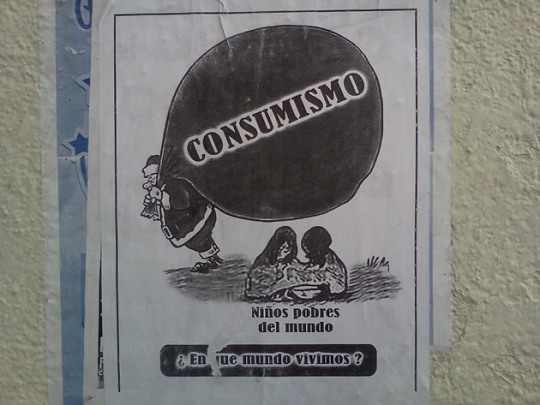
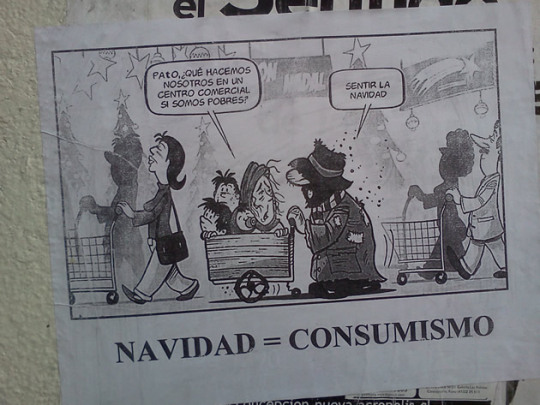
“I want you to spend a lot to prove that you love your family.”
Anti-consumerist Christmas posters seen around Concepcion, Chile
312 notes
·
View notes
Text
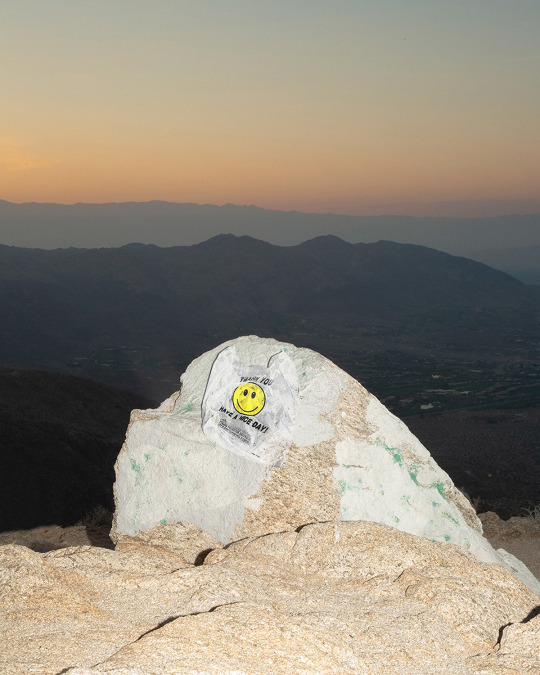
IF THERE WAS MONEY ON THE GROUND
SOMEONE WOULD HAVE ALREADY FOUND IT
KYLE BERGER | SERIES, 2019
#kyle berger#conceptual#consumerism#contemporary art#digital art#digital manipulation#if there was money on the ground someone would have already found it#photography#u
416 notes
·
View notes
Text
It's all connected. Corporations began marketing gay pride themed merchandise. An increase in "I-identify-as" populations began to flood gay bars and events, where outward appearance (marketed as "gender expression") became heavily emphasized.
Commercial visibility and marketability does not equal human rights progress.
Ability to consume does not equal citizenship to an oppressed group.
Biology, (referring to sexual orientation and sex) is not a brand you can buy into or boycott out of.
Corporations selling rainbows do not reflect our values.
The churning out of new "all inclusive" pride flags to pledge allegiance to is not indicative of liberation.
A historical homosexual slur being sold by the multi-billion dollar media obfuscates predominantly lesbian relationships ("queer women", "queer relationship") and retraumatizes many gay and lesbian people.
Gay pride only extending to people able to purchase detracts from the meaning of gay pride and distracts from the struggles of the most vulnerable. It positions the most privileged within marginalized and oppressed groups as those who represent the whole.
And associating body modification, aestheticism, and "expression" with self identity turns the lived experiences and material realities of entire subgroups of people into niche market categories that people who aren't even a part of these groups can identify into and out of based on social trends.
Biology becomes devalued, overshadowed by the social and manufactured "genders". Infinite genders means infinite target audiences. Lived, material realities of certain groups of people become materialism.
Human rights movements are becoming human rights industries, with the wealthy more directly capitalizing off of the exploitation of the poor, of the homosexual, of the female, of the immigrant, of the dark skinned, of the mentally ill, of the disabled, of the sick, of the marginalized and oppressed.
Don't buy into it.
#tangent#LGB#LGBT#gay rights#gender#gender critical#gender norms#gay pride#pride flag#lgbt pride#queer#q slur#queer identity#identity#identity coining#feminism#anti capitalism#woke homophobia#consumerism#capitalism#corporations
844 notes
·
View notes
Text
ther are other places besides Starbucks to get coffee, some better, some cheaper, some honestly far superior
Please pick a place you genuinely prefer not just "if i don't have time/money for Starbucks". if you only drink at starbucks, this poll ain't for you
This is US centric bc Starbucks is almost more iconic than McDonald's here
*local places can be any establishment that serves coffee, even if it's not what they are known for
#coffee#starbucks#business#food#consumerism#tumblr polls#polls#food poll#us american#cafe#café#cafe aesthetic#og
278 notes
·
View notes
Text
Research has consistently shown a positive relationship between exposure to advertising and the strength of materialistic values, especially within children. Analysis of US children and adolescents over several decades highlighted that when a country spent a greater amount on advertising, levels of materialism among youth also tended to be higher (Twenge & Kasser, 2013). Children who are exposed to a greater amount of consumer advertising go on to display stronger materialistic values and a greater desire to purchase the advertised products. This effect is particularly strong when people perceive advertisements to be an accurate portrayal of real life.
What is worrying is that children from less affluent backgrounds appear to be more exposed to consumer advertising, tending to spend more time watching television or living in more urban areas with higher levels of outdoor advertising present. This could mean that they risk developing higher levels of materialism. A study of 9–13-year-olds in the UK (Nairn & Opree, 2021) found that a much greater percentage of deprived (47%) compared to affluent (23%) children agreed that “I would rather spend time buying things than almost anything else.”
[...]
This negative impact of materialism on wellbeing has been documented across people’s lifespan. Some studies have suggested that the link between materialism and poor wellbeing is stronger for children from deprived backgrounds (Nairn & Opree, 2021), implying that advertising and materialism may promote a process of upward comparisons, whereby those people who do not have the affluent lifestyles that advertising promotes, and materialism desires, come to feel that they do not meet societal standards, hindering their self-esteem.
Materialism doesn’t only cause problems for the person holding the strong materialistic values, it’s also bad for social relationships and the health of the planet. Exposure to materialistic cues such as consumer advertising has been shown to lead to anti-welfare attitudes and less helpful behaviours. People who are more materialistic also care less about environmental issues and engage in fewer sustainable behaviours.
259 notes
·
View notes
